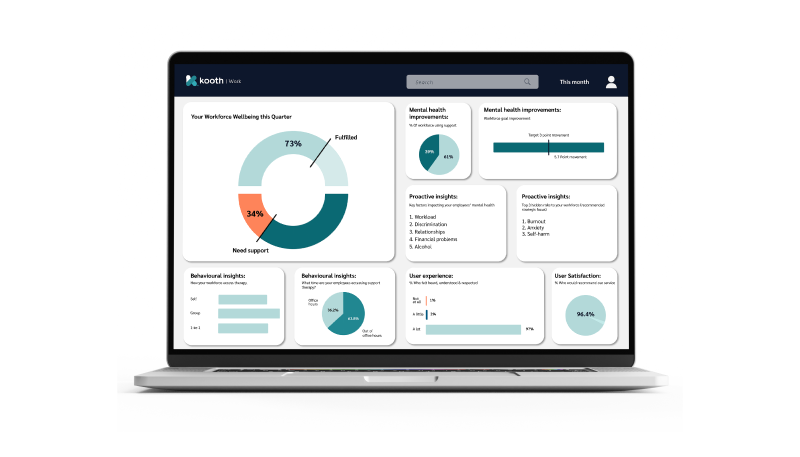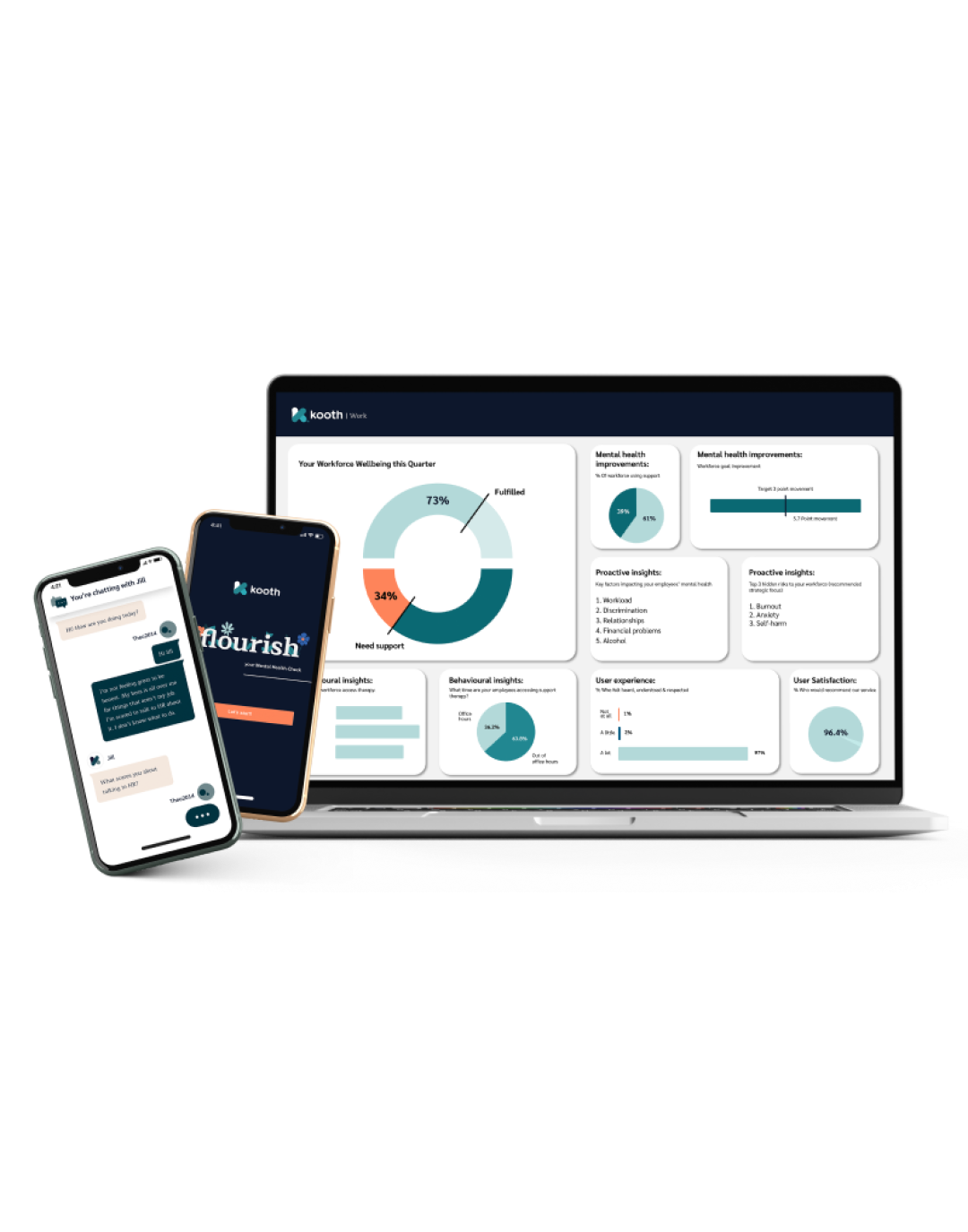Data insights and reporting are essential for improving workforce mental health and are central to creating a proactive workplace mental wellbeing strategy.
How much do you know about the mental wellbeing needs of your workforce? How engaged are your employees and what support options do they most want? What are the hidden risks you need to tackle this year?
It’s likely that most departments in your organisation receive access to reporting and rich insights to help them to improve results and become more effective in their respective areas.
However, HR and Wellbeing teams often don't have much data to work with, which forces them to make decisions based on anecdotal or partial insights that aren't truly reflective of what your workforce needs.
Let's take a look at how HR and Wellbeing leaders can develop highly effective workforce mental wellbeing strategies...by using data insights and reporting.
Informing your wellbeing strategy
Much of the challenge around wellbeing reporting, and more specifically, mental health, is the need to protect personal data. However, reporting does not need to compromise confidentiality - especially if you provide anonymous support options such as Kooth Work (this will be explored more later in the article).
Informing workplace wellbeing goals
Reporting and insights are essential to improving the mental wellbeing of your employees and organisation. Having detailed insights into the current status of your workforce, such as relative levels of stress, anxiety, burnout, and risk of depression will help you define a baseline to improve upon.
Gaining visibility of the work and personal life factors that most greatly impact the mental health of your employees. Also the ability to see trends in presenting and hidden issues, will help you identify strategies to tackle these issues earlier with preventative and early interventions and reduce the potential for these factors to go undetected.
 Detailed and anonymised reporting helps inform mental wellbeing strategies for better outcomes
Detailed and anonymised reporting helps inform mental wellbeing strategies for better outcomes
Informing employee engagement initiatives
Data insights allow employers to identify themes and engagement initiatives to help employees. Factors such as bullying, financial hardship, family problems, and discrimination are easy to go undetected through face-to-face engagements in the workplace. However, certain insights tools can help to reveal these early on.
Employers can use reports generated from data insights tools - for example, anonymous surveys sent out periodically - to assess wellness trends over time. Insights tools can help gather real-time data, while protecting user confidentiality. They can also help you monitor workplace mental wellbeing scales, wellbeing KPIs, and rich qualitative data.
Informing your support options
By understanding your employees’ needs, the problems they are experiencing, and their preferred support options, you can identify gaps in your framework of support options and provide tailored support for your company’s diverse and dynamic needs.
Transitioning from a reactive to a proactive model
Data reporting allows employers to better understand the themes and commonly presenting issues. This gives employers an opportunity to create programmes aimed at early intervention and prevention, rather than relying on reactive and emergency treatments.
By taking a proactive approach towards managing mental wellbeing within their organisations, employers can ensure that their employees remain healthy and productive.
Monitoring outcomes and effectiveness
Data can enable wellbeing leaders to measure the effectiveness of any implemented initiative by tracking key data points, such as employee feedback, and by providing insight into how employees are feeling over time. This detailed analysis can be used to track how effective each initiative is in addressing underlying issues, so that your company can continuously work towards improvement.
How do you maintain employee confidentiality?
A main challenge with using insights and reporting data is maintaining employee confidentiality. In fact, through our research, 71% of employees said anonymity and confidentiality is most important to them when accessing mental health support.
Therefore, HR and wellbeing leaders may be opposed to using reporting to avoid the idea that they are constantly watching and monitoring their employees. Luckily there are ways to maintain complete confidentiality for employees through anonymised insights and reporting.
Anonymised reporting means information cannot be traced back to an individual because the reporting is provided at a cohort level. This enables wellbeing leaders to view trends and data for an office, region, or business unit - but not at an individual person level. It’s good to know how your company’s providers maintain user anonymity.
Qwell and Flourish’s completely anonymous service
For some employers and employees, anonymising reporting does not go far enough. This is where services such as our Qwell employee support platform and Flourish workforce mental health check products can provide an extra level of confidentiality to employees and still provide employers with the detailed insights.
All Kooth Work products are completely anonymous from the start, so there is no risk of confidentiality conflicts. The reports and insights are detailed and informative, and because employee users know that they are anonymous when they use the mental health support options in the platforms, you receive a true reflection of what your workforce is experiencing and their feedback.
 Employees want to protect their identity when it comes to mental health
Employees want to protect their identity when it comes to mental health
In summary
All in all, data insights and reporting are key components of an employer's effort to improve the mental wellbeing of their workforce. They help employers gain an improved understanding of a workforce’s support needs and challenges through regular monitoring of wellbeing status and support effectiveness. Reporting provides invaluable information that enables businesses to tackle issues head-on while encouraging a positive company environment. Providing completely anonymous support provides the opportunity to gain more truthful insights into what is really going on under the surface.
Additional reading:
Flourish workforce mental health check
Missing the Mark - the Flourish findings report
 Without reporting and insights business and wellbeing leaders are left to guess what will work best for their workforce’s mental health needs
Without reporting and insights business and wellbeing leaders are left to guess what will work best for their workforce’s mental health needs





